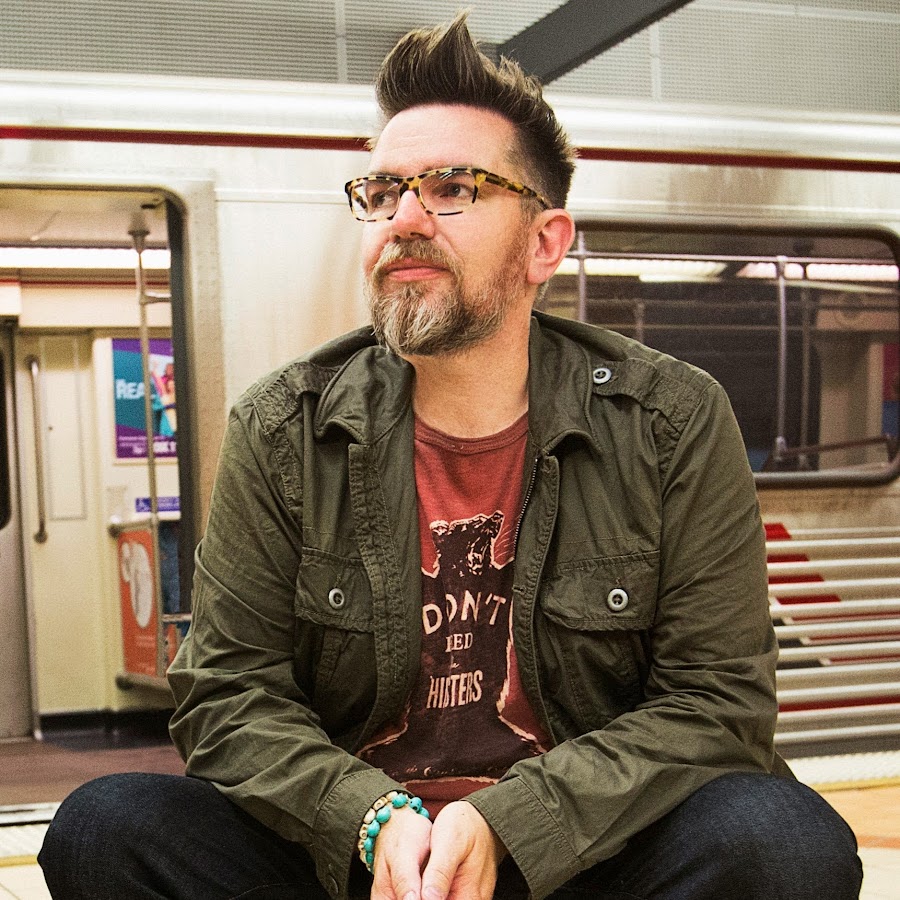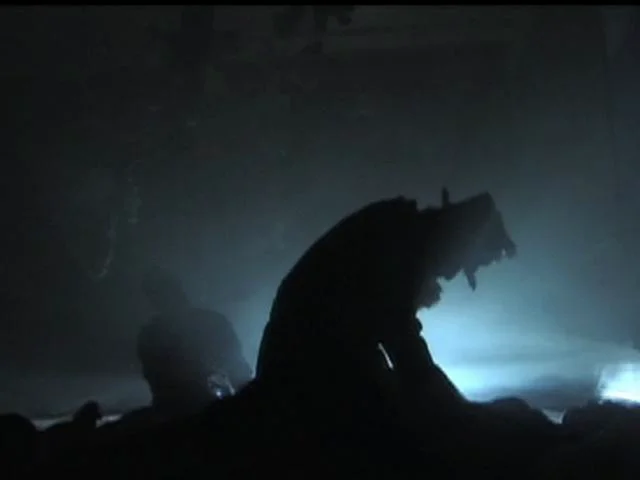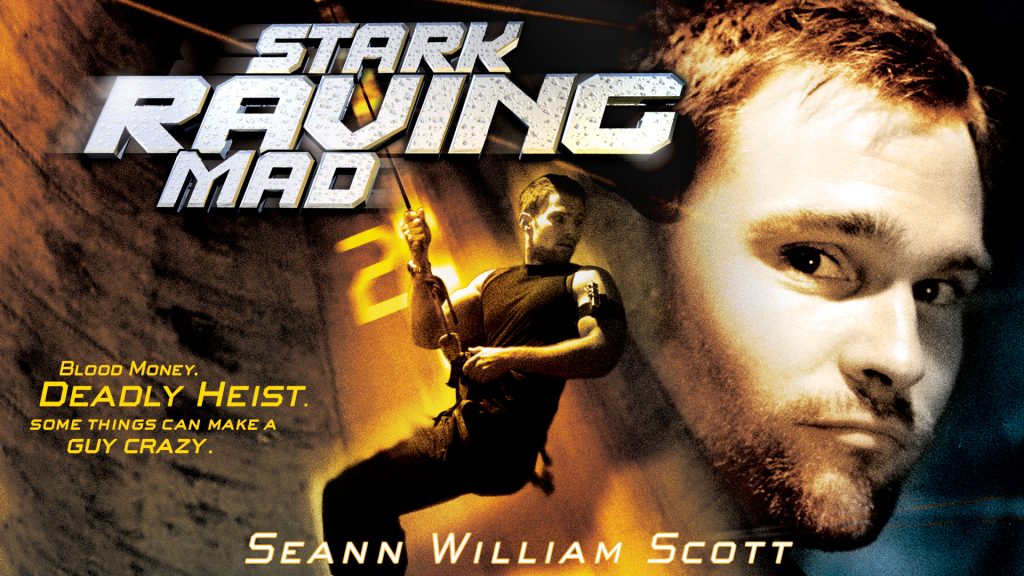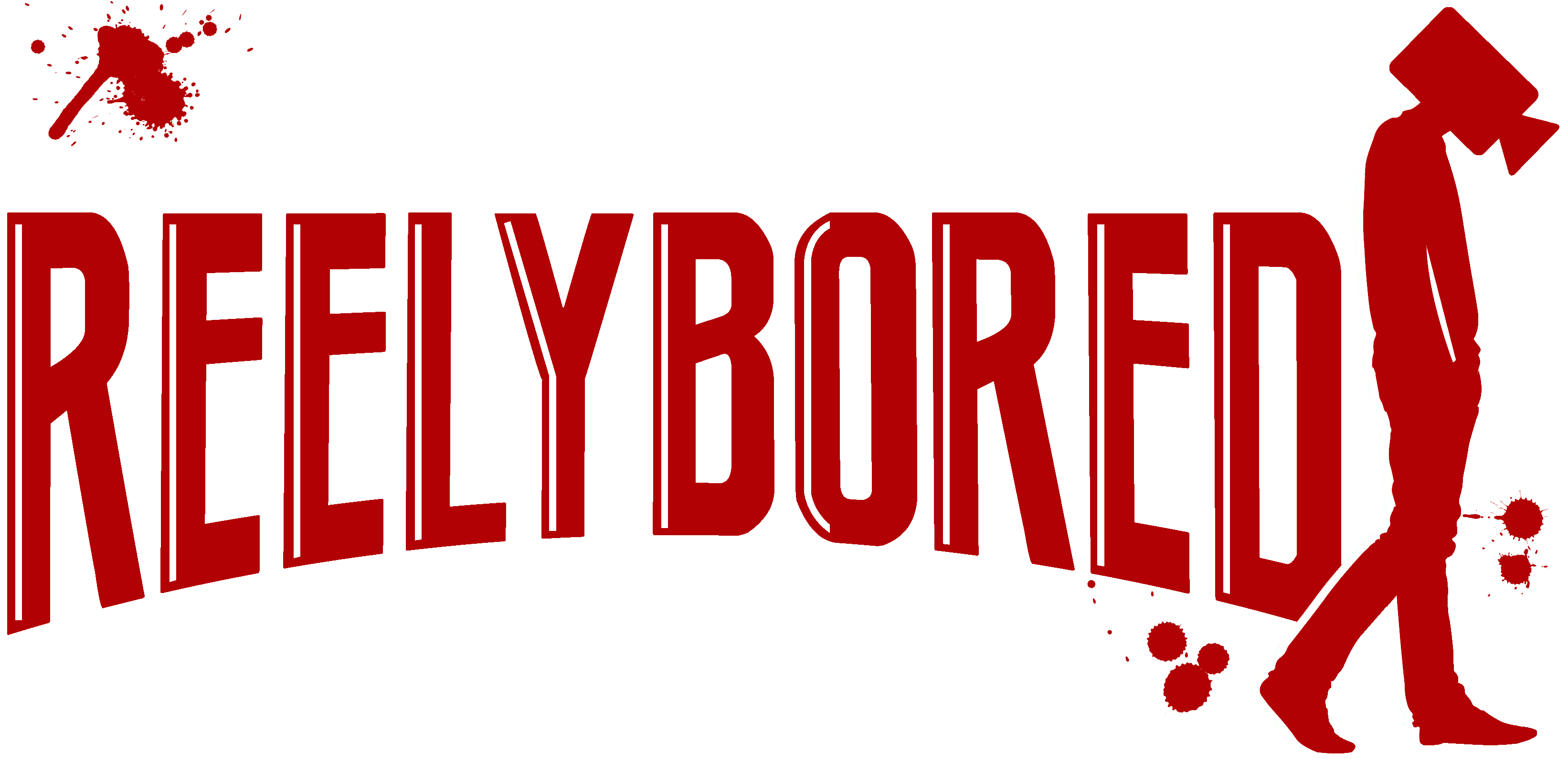Drew Daywalt Interview

Do you like to be scared?
If you answered yes, then there is, without a doubt, a need to check out Drew Daywalt and his horror micro-terrors. Helming from the shadows and depths that is Fewdio, Drew has stepped out into the light and has developed his repertoire in The Daywalt Fear Factory that has been worthy of what, I would call a cult following.
Exactly who is Drew Daywalt?
Some would say he is a Jack of all trades and a man of many talents, credited with many shorts and features under his belt as a writer, director, producer, cinematographer, production designer, art department, editor, visual effects, and casting director. Phew! What does this say about him? Having been credited for most of these roles on his own projects, I’d have to say that he has a passion for his work and achieves what many strive to do with their hard work and sweat. For this, I admire and discern Drew as an inspiration, for he accomplishes what I strive to do, and that is to make quality films.
According to the Fewdio website, Drew is an Emmy-nominated writer who has been in the business for 15 years and exploits his artistic and very stylish vision features, television, animation, and commercials. Tony Scott, Jerry Bruckheimer, Brett Ratner, Neal Moritz sound familiar or ring any bells? Well, Mr. Daywalt has written screenplays for these Hollywood conglomerates, and it only speaks volumes about the talent Drew possesses. His first feature film Stark Raving Mad, produced by Quentin Tarantino’s company A Band Apart and stars Seann William Scott, Lou Diamond Phillips, and Paul Hungerford, who has also worked on Fewdio projects. Pretty impressive, huh?
I’ve learned that Drew is not about fame and glamor. He provides insights into the horror genre and produces invaluable information to aspiring filmmakers on his blog on Fearnet.com’s “School of Fear“.
I spoke to Drew and, being the great guy that he is, sat down and answered a few questions for me. For those interested in filmmaking, read on as he provides some very ingenious and useful information that gives all of us little people some hope. Well, it does so for me at least. But, I’m confident when I say that you will find a lot of what Drew has to say inspirational in that he proves that numerous so-called hurdles, that many of us lowly filmmakers are afraid to jump over, really aren’t that difficult to overcome. Am I coming off as a fan-boy? Well, what can I say? I’m a fan. Maybe Drew will finally shed some light on exactly what the word Fewdio means.
ReelyBored: What made you want to be a director?
Drew Daywalt: Being a screenwriter made me want to be a director. You see enough people misinterpret what you wrote and eventually, you just say, “Fuck it! I’ll do it!” I never had a burning desire to direct. My desire has always been in the writing. But once I started directing, it really hooked me.
ReelyBored: I understand what you’re talking about. When writing, you have a certain vision that others find hard to convey and you end up wanting to do it yourself so that your vision can come across the way you see it mentally. As a writer, have you ever “bumped” heads with a director who was on the verge of altering that vision?
Drew Daywalt: I have never actually bumped heads with a director who was working on a project with me. The worst thing a writer can do is “not” trust the director. In a perfect world, he gets what the original intent of the story was and will put his spin on it and make it better. And the worst thing anyone can do is throw sticks in the director’s spokes as he’s trying to make his vision happen. So I always would let them run with it and hope for the best. As it happened, I was rarely pleased and finally just did it myself, but I never had a bad relationship with any of the directors I worked with.
ReelyBored: What is your most memorable moment on set?
Drew Daywalt: I have so many memorable moments. That’s a great question! I think my most memorable moment on set is probably last year, during the filming of CAMERA OBSCURA, when my lead actress, Reagan Dale Neis, was doing this really heavy moment in the show where her character discovers some very emotional things about her deceased grandfather. We were trying to film this really heavy scene on location, and the woman who owned the location started making a sandwich in the kitchen, loudly, in the room next door. Fridge opening and slamming shut, jars of mayo being unscrewed, bread wrapper rustling. And I was in a situation where we were almost out of time and I couldn’t even cut. I thought, “Fuck… this is going to break Reagan’s concentration.” But Reagan powered through it. I thought maybe she didn’t even hear the noise. But she did, and she blocked it out. Four months later when I showed the scene at a private screening, everyone in the screening room was in tears. We’d done it! That’s an indie film in a nutshell. Ridiculous parameters that you’re forced to work with, and then pulling off that “Hail Mary”. Reagan was inspiring to work with.

ReelyBored: What directors are your greatest influences?
Drew Daywalt: I’ve always called myself the bastard stepson of Danny Boyle and David Fincher, with a little Kubrick sprinkled in. I dunno that I live up to any of that, but it’s a goal. I love Boyle’s visual language – the way one scene blends into the next. I love Kubrick’s clean simplicity, and I love Fincher’s lush “worldscapes”. And they are all world builders. That’s what I want more than anything, to build worlds that we can all go play in for a while.
ReelyBored: Any awkward/weird moments on set when starting out as a filmmaker?
Drew Daywalt: I was lucky in that directing wasn’t my first job on set. I worked in the art department for 5 years. Because of my art school background, I moved up to production designer and did a lot of work in that department before even selling my first script. So I had a lot of experience on set in various roles before taking foot on set as a director. That helps a lot when you speak the language of the crew. You look a little less like an idiot that way.

ReelyBored: I know that you have Stark Raving Mad under your belt, but most people know you for your role in horror with Fewdio and now Daywalt Fear Factory. Do you mind being typecast as a horror director or do you want to be able to branch out into other genres?
Drew Daywalt: I actually started in music videos and commercials, then got into studio comedy and action films and, ironically, have worked hard to get OUT of other genres and into Horror. Horror is my goal, so I’m glad to get pigeon-holed here. It’s where I want to be. So, on the way in here, I saw other directors running past me for the door trying to get out. Fuck that! I actually want to be here. I’m a horror-fantasy, sci-fi fan and I want to build worlds. I’m one of the few who actually wants to be here because I don’t look down on the genre or the fans. I get them. I am one.
ReelyBored: Being a horror fan, and an aspiring filmmaker, many times I’ve had people tell me that it is better to do horror for the Independent Market as it is the “easiest” genre to do. Of course, I don’t agree with that. What do you say to a comment like that?
Drew Daywalt: Horror is not the easiest thing to do. It’s the hardest. Harder even than comedy. If you doubt that, look at how many good comedies there are compared to really good horror films. Horror is incredibly difficult as a genre and I think anyone who says it’s easy doesn’t understand it at all. They think it’s just a hot girl, a bucket of blood, and a maniac du jour. But that’s not horror. It’s trash!
ReelyBored: When did you realize that you “made it”?
Drew Daywalt: I’ve made it? [laughs] I knew I made it “creatively” when the WGA (Writer’s Guild of America) strike started a few years ago and I found myself shooting short films when we (the writers in the WGA) weren’t allowed to work on features. I realized it was an addiction then, and a healthy one! One that feeds my soul. I don’t care if I’m making money doing this or not, I’ll be doing it regardless, for its own sake. For art’s sake. Somewhere out there, some of the bankers execs, and agents are laughing at that comment, but fuck ’em! They don’t get it. The smart ones do though, and that’s who I like working with.
ReelyBored: Having the money and the means are often obstacles for independent filmmaking. What do you say to those who can’t afford a good camera, who can’t afford a crew and equipment to make their film look “professional”?
Drew Daywalt: With all the really good, new cheap technology out there like Final Cut Pro editing software, the Canon 7D, and the Zoom h4n, gear is becoming less and less of a hurdle for directors. What’s key is always a good story and the ability to film it simply (at first), until you really know what you’re doing. The indie film world is becoming more democratized and that’s a great thing.
ReelyBored: My last shot with this question as I’ve tried with both Paul and David and if you can’t answer then I’ll be convinced that there is a conspiracy. Where does the word itself, Fewdio, come from?
Drew Daywalt: You’re right, there is a conspiracy and my lips are sealed. I’d tell you, but I took a blood oath, seriously not to tell a soul.
ReelyBored: Why did you part ways with Fewdio?
Drew Daywalt: It was a very amicable parting. Three of the five principles of Fewdio were at my wedding, so these are dear, dear friends of mine. The idea of Fewdio was to help it to launch all of us collectively and individually because we all respected each other’s careers. When I got the offer to write and direct Camera Obscura outside of Fewdio, and then to help launch Fangoria Film’s new indie film division, they were very supportive and thought it was great. Each of them has continued with their own projects and it’s been like a collective more than a company. Because of the economy, everyone’s focusing on their own work. I just decided I’m going to keep making these shorts, and I got offered the chance to do these two features this year so I’m going to do that. Daywalt Fear Factory is just my desire to constantly be making these films, making new contacts in the horror community, and giving people chances. I enjoy it so much. It’s no different than a feature shoot. We do ‘em in about 6 hours and we keep them contained. It’s like a poker night for us, or a movie night. Instead of doing a Freddy Krueger marathon, we get together and make something. That “for the love of it” approach is one of the reasons I’m going to continue with Daywalt Fear Factory.
ReelyBored: Aside from making great shorts, what do you hope to accomplish with Daywalt Fear Factory?
Drew Daywalt: I hope to become synonymous with good feature horror films the way I’ve become synonymous with rock-solid horror shorts. The film festivals and internet fans and horror websites have treated me incredibly well. And I’m REALLY grateful for that. Now I’m working to parlay that into horror features and studio horror and continue in long form. But as for short-form horror, I’ll never stop doing that. Ever. It’s too fun.
ReelyBored: How did you get to where you are today, from a filmmaker’s perspective?
Drew Daywalt: Following and making opportunities as they came before me. It’s been a lot of serendipity and shoe leather. There’s no secret recipe. Just keep doing what you do and the crazier they tell you that you are, the more you know you’re on the right path. Pioneering means going off the known path. And if everyone on the path is telling you you’re nuts, you’re very likely doing exactly the right thing.
ReelyBored: How did you get involved with writing “School of Fear” for Fearnet.com?
Drew Daywalt: My short films were winning a lot of accolades at the film and horror festivals, and I was being invited to speak on the subject at a lot of venues. One of these was at the Magic Castle in Los Angeles where I spoke on a panel with K.W. Low of Dread Central, and Sean Redlitz, Editor in Chief at Fearnet. I got to be friends with both of them, and Sean saw me speak publicly a few times and realized I was a bit of a horror academic as well as a filmmaker and offered me the blog. I was warmly welcomed into the Fearnet family by Lawrence Raffel, Spider One, and Audrey Cleo who are all great horror authorities as well. And it’s been a great marriage.
ReelyBored: Honestly, what do you think about film school?
Drew Daywalt: I loved film school, but then again, it was mostly because of my friends and peers. I went to Emerson College in Boston and we were heavy on film theory and light on practical experience. So we graduated knowing why Metropolis and Bladerunner were cinematic sisters, but couldn’t tell the difference between a c stand and a matte box. All that practical stuff came later, working journeyman style on film sets under great crew people. And a lot of my peers are doing well in the industry and we do try to help each other out when we can.
ReelyBored: How hard/easy is getting the world to see your work? Do you feel accomplished in having shared your vision?
Drew Daywalt: It used to be hard. But welcome to Web 2.0 where everyone can get their vision out there. I do feel accomplished in sharing my vision, but that’s the thing about having a vision – it never ends. It’s not like you say, “Well, they’ve seen my stuff, I’m done,” so I continue to strive to show the world what I’m up to.
ReelyBored: Certain directors are remembered for one thing or the other, John Carpenter for horror, James Cameron for his action/epic films, etc. What kind of director do you want to be remembered as?
Drew Daywalt: I want to be known as a really nice guy. [laughs] That and the guy who could open the curtain on a world you didn’t know was there, and invite you in to play in it, even for a little while. A world builder. I guess that’s what I’d like to be known for – creating new places.
ReelyBored: You’ve co-directed many shorts as well as Stark Raving Mad with David Schnieder, what’s it like co-directing and sharing a vision?
Drew Daywalt: Dave is my best friend and an amazing creator. We love working together, and when we work separately we’re always involving each other. It’s like a really successful marriage – a good writing partnership is.
ReelyBored: What’s in the works for Daywalt Fear Factory?
Drew Daywalt: I’m about to direct and produce, The Ringbearer, for Fangoria Films’ new film division. I just finished the script last month and we’re moving toward pre-production before the end of this year.
The Ringbearer is the story of a young man in NYC who ends up becoming involved in a 600-year-old secret war between the vampires (called The Exsanguine) and the hunters who fight them (called The Venatori). In 1413 AD, a rogue sect of the catholic church who dedicated themselves to fighting supernatural creatures created 9 rings that would give the 9 greatest vampire hunters the one thing they would need to beat the vampires. Immortality. And so a secret war has waged between these hunters and the vampires. But if the ring comes off the hand, the hunter dies.
I sold the pitch to Fango when they said they were looking for a vampire script. Tom Defeo asked me if I had anything and I said yeah, but it was the polar opposite of Twilight. Something for Horror fans instead of pre-teen girls. He asked me how it was different and I said I’m going to treat my vampires as hideous abominations, not angsty sex symbols. My vampires are beasts, demonic creations, not just rabid humans or human-bat hybrids. Imagine Heironymous Bosch doing them.
ReelyBored: What kind of tips/suggestions/advice would you give to an aspiring filmmaker?
Drew Daywalt: Get a camera and go! Most of what I learned, I learned practically. Don’t know a piece of equipment or intimidated by an editing program? Get your hands on one and monkey with it until you figure it out. And watch every film ever made and don’t stop brainstorming your ideas. That’s pretty much it.
